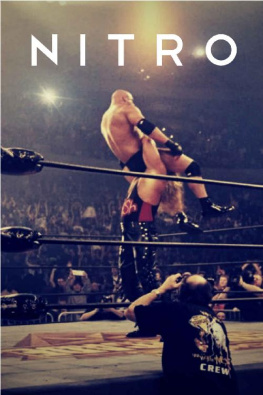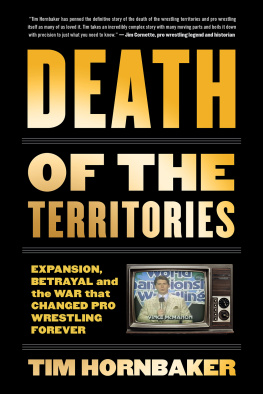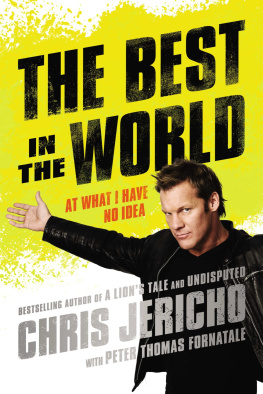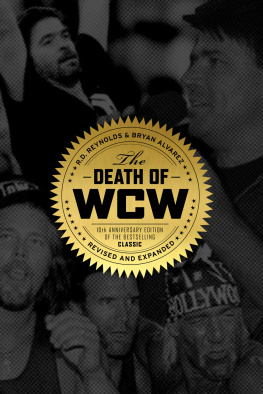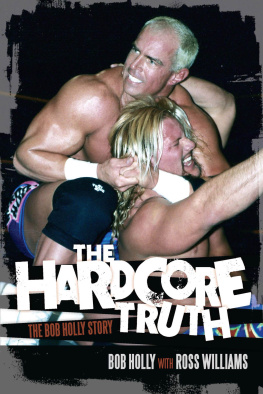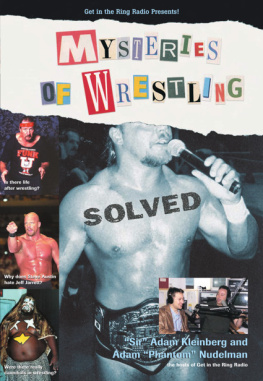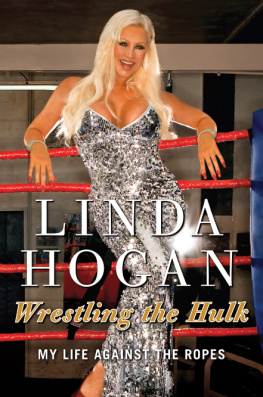Contents
NITRO
The Incredible Rise
and Inevitable Collapse
Of Ted Turner s WCW
Guy Evans
Nitro: The Incredible Rise and Inevitable Collapse of Ted Turners WCW 2018 by Guy Evans. All rights reserved. Printed in the United States of America. No part of this book may be used or reproduced in any manner whatsoever without written permission, except in the case of brief quotations embodied in reviews.
ISBN-10: 0692139176
ISBN-13: 978-0-692-13917-2
For Aysha and Nicky
Chapter 1:
The Offer
May, 1995
1 CNN Center, North Tower, 14th Floor
Atlanta, GA
Y OU COULD ALMOST be excused for missing it.
After all, it stood rather inconspicuous amidst a sea of decorative souvenirs. Indeed, some eyes were first drawn to the accolades on display - the prime-time Emmy, the CableACE award, TIME Magazines Man of the Year cover - while others stared more intently at Jane Fondas image, showcased alluringly in a framed photograph. Perhaps most captivating, however, was the sight of Leo, a full-bodied stuffed lion who curiously resembled - and increasingly so, with each passing glance - the one whose roar set the stage for those classic MGM movies. A persistent rumor posited that it could be the actual lion , who by now had clearly seen better days. Leo looks sick , thought some recent visitors.
But there it was, silently demanding your attention in the middle of the room. At the front of the desk in this top-floor office, a solid brown plaque displayed an insightful refrain:
Either lead, follow or get out of the way .
The artifact was as revealing as it was succinct. The plaque, the office, and the building (for all intents and purposes) belonged to Robert Edward Turner III - better known to the public as the eccentric media mogul, Ted Turner. On a particularly humid Atlanta day, Ted surveyed the downtown district and contemplated the standing of his pioneering cable television enterprise, Turner Broadcasting System (TBS , Inc) . Teds broadcasting empire, which included ownership of New Line Cinema, CNN, and the Atlanta Braves, seemed to be under no immediate threat. For now, there was the simple matter of an executive committee meeting, a monthly gathering that functioned as a pep rally of sorts for both the charismatic Chairman and his high-level suits.
As a faction of key executives entered the room, Ted cast his 56-year old pale blue eyes at a veritable whos who of TBS, Inc. Among those in attendance were Terry Foster McGuirk, Turners Director and Executive Vice President; Randolph Randy L. Booth, a former Chief Financial Officer now working as an adviser; and the Director and Vice President of Turner Entertainment Group, Scott Sassa, widely considered to be the heir apparent to Turners throne.
As the agenda moved to AOB - any other business - Booth announced with palpable glee that an unsolicited offer had been received for one of Turners subsidiary companies. It was an offer to purchase the organization whose televised presence - for many of the TBS corporate brass, at least - had been nothing but a constant source of embarrassment. In an ironic allusion to its place in the organizational hierarchy, this particular entity was listed last on the companys inventory of 150 controlled assets (the list was compiled of course, as is standard for the SEC, in alphabetical order).
Booth reported that an offer had been made to purchase World Championship Wrestling (WCW), Inc . - the Turner-controlled pro wrestling outfit and notoriously inept money-loser. Since its official inception some seven years earlier, WCW had never so much as made a single dollar in profit, and to many, its continued survival was as perplexing as its creation.
Apparently, Ted possessed a soft spot for his wrestlers - or rasslers as he would call them - because WCW had simply never gone away. Its origins could be traced back to 1972, when a regional organization known as Georgia Championship Wrestling ( GCW ) produced a self-titled television program on the Turner-owned WTCG station. The wrestling show, in addition to Atlanta Braves coverage and Andy Griffith Show reruns, propelled WTCG to become the original cable network, reinventing the entire television industry.
In 1979, following the networks re-branding to WTBS (and eventually, simply TBS), GCWs show - now billed as World Championship Wrestling - became the first wrestling program to be broadcast across America. By 1982, the series achieved the unprecedented distinction of attracting a million viewers on cable, solidifying its status as a legitimate cultural institution in the South. But in April 1984, following some tumultuous internal strife, GCW (and its hallowed 6:05pm Saturday timeslot) was sold to Vince McMahon, Jr., newly minted owner of the Connecticut-based World Wrestling Federation (WWF). Three months later, on July 14, 1984, McMahon stunned the loyal GCW audience with an unannounced appearance on TBS television - an occurrence that came to be known as Black Saturday . While previously, fans had been used to bouts produced intimately in an Atlanta sound studio, the new show featured taped matches from Madison Square Garden. It was still wrestling, but it wasnt rasslin , and consequently, the reaction to the change was catastrophic.
In response to mounting complaints and sinking ratings, an angry Ted Turner looked for restorative action. He decided to effectively compete against McMahon on his own network, providing rival promoters with air time around the Saturday night show. Hampered by Turners decree, the WWF ceased to enjoy exclusivity on TBS, and so with his financial incentive dwindling, McMahon begrudgingly sold the time slot rights (and World Championship Wrestling name) to promoter Jim Crockett, Jr. in March 1985 (attaching the promise, according to wrestling lore, that Crockett would live to choke on his investment).
After the purchase, Crocketts company - Jim Crockett Promotions (JCP) - became the second-biggest wrestling organization in the country. But after several years of unsuccessful competition with the WWF, talks began to engineer a sale of JCP to Turner Broadcasting. For Ted Turner , whose growing empire demanded the need for popular (and cheap) entertainment programming, the opportunity to acquire a wrestling company seemed like a fairly logical strategic move. After all, his guiding principle, formed in the early days of running his fathers billboard business, was to constantly seek to acquire assets. His famous refusal to sell the library of old films that eventually became Turner Classic Movies showed that the approach appeared to work.
Besides, his aides thought, Ted simply got a kick out of the populist pageantry, over-the-top characters, and soap opera-type storylines that accompanied the pre-determined bouts of wrestling. And so, on November 2, 1988, a reported $9 million sale of JCP to Turner was made official. Using the World Championship Wrestling moniker as the name of the new company, WCW was officially born, and soon it began to separate from its historic territorial roots.
But after a mostly well-received first year in operation, a series of horrendous managerial decisions and bizarre on-screen stories entrenched WCW as a distant number two, trailing pitifully behind McMahons WWF. Undoubtedly, TBS wrestling outfit - to a sizable number of its own executives, no less - was already an absolute joke, often failing to ensure sufficient crowds despite giving away tickets en masse.
And then there were the demographics. Oh, the demographics! While an oft-repeated gag theorized that WCW exhibited the opposite of PBS syndrome (far more people, as indicated by the Nielsen television ratings, watched the programming than were willing to admit), those that apparently did watch represented a portion of the audience that simply repelled advertisers. While the viewership for WCWs various syndicated programming and its flagship show on TBS - WCW Saturday Night - significantly contributed to the networks overall numbers, an inherent stigma associated with pro wrestling suggested that it appealed mostly to a low-income, low-education, low-on-sophistication crowd.

